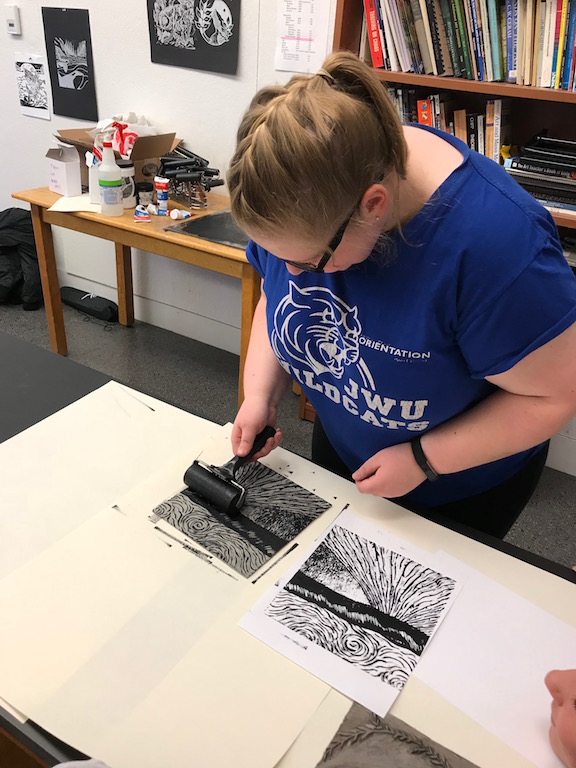This year, seven art education students found inspiration in Wabanaki folklore for their University of Maine Art Education Student Outreach project.
Students enrolled in Professor Constant Albertson’s AED 474: Topics in Art developed original linoleum blocks and used them to print t-shirts intended to be sold on campus and in the community. All of the proceeds will go toward supporting the programs and activities that the Gedakina, Inc. fosters in Native American communities across New England.
“As I was designing the course I researched many Wabanaki issues,” Albertson said. “The students talked it over and did research. We were very excited to work with Gedakina. We didn’t want the product to be another bauble, something that you shove in a junk drawer, and we thought it would be important to use relevant images and symbols.”
In AED 474, Albertson hoped to teach her students skills in collaboration, negotiation and leadership, while showing them how to integrate an art curriculum with community service efficiently.
“Art is critical to creating culture and community,” Rochelle Lawrence, an art education student enrolled in AED 474, said. “It creates awareness of the people, animals, nature and history that have come before you.”
Gedakina, which means “Our world, a way of life” in the Wabanaki language, works to bring like-minded community members and allies together to support and empower Native American and indigenous youth. They also work to challenge racism and continual colonialism and encourage inclusiveness and diversity.
“Our hope is to provide opportunities for youth and women and to promote self-efficacy,” Kathy Pollard, full-time Gedakina staff member and Allied Building & Development leader, said. “I met Connie through the Decolonize Maine committee, she invited us to be the partners for this class. We decided to use the funds to help our work toward recovering traditional agriculture at a farm in Starks, Maine on the Sandy River. This will be the first time in over 250 years indigenous people will be using the property.”
Gedakina acts as a co-organizer and leader in many programs and activities across New England. A local example of this is their work as a lead partner in Justice for the River, an organization that fights to protect the Penobscot River from over-development and pollution and supports the Penobscot Nation.
For their project, the students studied Wabanaki stories and found inspiration in their lessons and themes. Lorelei Hipkins, a third-year art education student involved in the project, used a story that ignited childhood inspiration to design her linoleum block.
“For my piece I read a creation story,” Hipkins said. “The creator came down to earth and made life from rocks. They were too strong and he had to destroy them, so he tried again with ash leaves. The ash leaves were able to interact with the earth in similar ways to humans. It brought back my memories of summer camp, where we would sing songs of a raindrop traveling down a mountain and becoming a part of the river. It was cool because something small was turning into something much bigger.”
Hipkins said her personal connection to the narrative is an example of why it is important to teach about other cultures through art.
“Through this class I have learned you can make a difference,” Hipkins said. “It’s important to know how as a teacher to talk about bigger issues through art in your classroom. We talked a lot about applying for grants, and how to bring projects like this into the classroom.”
This is the message Albertson hoped they would learn through the project and carry on into their classrooms.
“I want to show them that art does have meaning,” Albertson said. “They can teach lessons that can be meaningful to students, and that have meaning and relevance in their community. They can teach their students how to learn about themselves, their community, and other communities through art.”
To learn more, talk with the artists or purchase a t-shirt for $15, visit the Memorial Union on Wednesday, April 11 from 7:30 a.m. to 1:30 p.m. or the following Wednesday, April 18 from 11:30 a.m. to 1:30 p.m.










